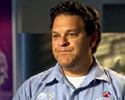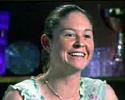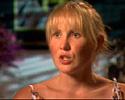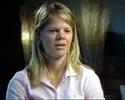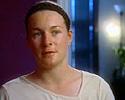
Recently on Cyclingnews.com |
News feature, February 21, 2006
AIS survivors tell of crash and recovery
The Australian Institute of Sport riders who were hit by an out-of-control car in Germany last year told their stories to Australian TV last night. John Stevenson was watching.
|
|
|
|
|
|
|
|
|
|
Four of the survivors of the July 2005 crash that killed Australian rider Amy Gillett and hospitalised five of her team-mates featured in Australian current affairs TV show Australian Story last night, along with their coach and Amy Gillett's husband.Lorian Graham, Katie Brown, Louise Yaxley, Kate Nichols and coach Warren MacDonald talked about the crash in which the riders suffered horrific injuries, describing the impact and its immediate aftermath.
For readers outside Australia, or who missed the program, it's available on the ABC's website in Flash 8 video format.
MacDonald watched the crash from the team vehicle as the riders rolled down a minor country road in Germany on July 18, 2005 while recconoitring the course for the opening time trial of the Thuringen Rundfahrt near Zeulenroda.
"I saw it all unfold in front of me I saw the accident happen in front of my eyes because I was following behind at somewhere between 60m and 100m," he said.
Graham recalled seeing the car approach the group. "We went down the last rise in the road and it was then that we sighted a car that went out of control," she said.
Katie Brown saw her team-mate Amy Gillet hit. "As I looked back Amy was getting hit by the car and she got flung back and the next thing I knew I was getting hit by the car and going over the bonnet, doing a few somersaults and landing on the ground and rolling into the ditch."
Lorian Graham was still conscious after the crash. "It was just the biggest bang and I remember the silence when everything came to a standstill. I looked around and no-one else was moving. I thought 'we're in a very bad situation.' I'll never forget the look on [Warren MacDonald's] face as he got out of the car."
MacDonald flagged down a security vehicle and called for an ambulance, and then had to make the agonising decision of which of the riders to help.
"To help these girls live. That's what went through my mind," he said. "What can I do? I went back to the girls. It was the hardest decision, to survey the scene and decide what to do. You have to prioritise. Amy was deceased and I had two other girls [in critical condition] and that's a decision that lives with me for the rest of my life."
Yaxley credited MacDonald with saving her life. "The doctor who was in the helicopter that arrived said I would have had two minutes left because I had lost so much blood…" she said. "So I know that if Wozza hadn't acted as quickly as he did that I wouldn't be here."
Graham was also full of praise for MacDonald's actions after the crash. "My coach was a tower of strength," she said.
But MacDonald himself, who was visibly emotional through much of the program, said he was putting on a brave face. "I didn't feel very calm at the end of it [but] if the girls saw me upset that wouldn't help their case and that was it. [I was ] trying to be strong for those girls to make sure they survived."
Yaxley detailed her extensive injuries. "I damaged the frontal lobe and had a brain clot," she said, "my lungs collapsed, I damaged some ribs. I landed on my front in some windscreen glass… and some carbon fiber shards and they cut my arms open. My right arm was basically torn off. It was attached by, I think, two muscles. The artery was compressed. As I was landing I was impaled on a stick through my stomach."
"We're the lucky ones, we're here. Amy never got that chance. You feel guilty to talk about your injuries when Amy didn't get that chance. You feel you should be quite and get on with things; get the physio done and get the job done. You don't feel like you have a right to complain. Survivor's guilt; it's tough."
But survive they did, and the story becomes even more remarkable when it turns to their recovery. Kate Nichols, one of the least injured of the five, was back on her bike within a few months, but said she doesn't yet feel like racing. "The physical healing was quite quick; it's a matter of mentally getting around it and getting back out," said Nichols.
In a genuinely moving moment, Lorian Graham discussed the condition of her severely damaged knee with her doctor and was told that one option was to operate to remove the wires from her knee, which would restore motion. "It's really good news, I'll be able to ride my bike a lot sooner than expected," said a tearful Graham.
Yaxley was shown being reprimanded by her physiotherapist for "overdoing it."
"I have a bike waiting for me at the TIS but I have been told that until I can a) reach the handlebars and b) put the handlebar tape on myself, it's staying there," said Yaxley.
In the final sequences of the program, Brown and Graham were back on the bike, albeit just a wind trainer in Graham's case. "I know I can get back on the Australian team," she said.
Meanwhile Yaxley also got good news - the skin grafts on her arms can be tidied up. "It's made my week. I'd gotten used to the fact that my arms were going to be like this for the rest of my life and finding out that they're not going to be is awesome."
The creation of the Amy Gillett Foundation has brought some positive from the tragedy. Simon Gillett explained, "On the Thursday two days after the accident the idea was hatched. The initial thought was to prolong the memory of Amy and to try and focus something positive out of what had happened. There will be a scholarship for an up and coming female cyclist and the major part of the foundation is the road safety thing to try and make motorists and cyclists more aware of each other on the road and try and make it a safer place to be."
The program steered away from emphasising the dangers of cycling - something it could have been forgiven for given the subject - and instead gave as much prominence to the things riders get from our sport.
"When I'm riding, and it's a beautiful day and everything is perfect, it just feels wicked," said Yaxley. "It just feels right, and you feel free and comfortable and it's just a release!"
"The Australian team was regarded as competitive and threatening. We scared them all," she added with a smile. All four clearly believe they will be back to scare them again.
The complete program, plus fuller interviews with Warren MacDonald, Louise Yaxley MacDonald's wife Sian and AIS psychologist Ruth Anderson, is available at the ABC's website. The site also features producer Ben Cheshire talking about the unusually long process of making the program, and admits that meeting the riders has inspired him to go shopping for a road racing bike to add to his mountain bike.
Related stories
April 3, 2006: Mark Webber
cautions motorists to watch for cyclists in Amy Gillett's name
February 21, 2006: AIS survivors
tell of crash and recovery
February 7, 2006: AIS crash
verdict: "German law was applied"
February 4, 2006: AIS crash:
driver sentenced
December 25, 2005:
An interview with the survivors of the German tragedy
December 23, 2005: An
interview with Warren McDonald
December 13, 2005:
Emotional conclusion to Amy Gillett Charity Ride
Amy Gillett Foundation Charity Ride
diary
October 28, 2005: AIS women
at charity luncheon in Sydney
October 20, 2005: Yaxley making
solid progress
October 6, 2005: Investigation
in Gillett's death almost complete
August 24, 2005: Graham vows
to return
August 22, 2005: Yaxley and
Rhodes home
August 18, 2005: Rhodes and
Yaxley bound for home
August 14, 2005: Yaxley and
Rhodes continue to make progress
August 11, 2005: Brown vows
to return to cycling
August 8, 2005: More support
for Gillett-Safe Cycling Foundation
August 3, 2005: Rhodes and
Yaxley out of intensive care
July 29, 2005: Amy Gillett's life
recalled in moving service
July 28, 2005: Rhodes and Yaxley recovery
'amazing'
July 24, 2005: Yaxley improving, Rhodes
still unconscious
July
21, 2005: AIS head 'optimistic' about recovery; 'Brownie' tries his best
July
19, 2005: Unprecedented carnage in Germany
July
18, 2005: Amy Gillett dead after crash in Germany

